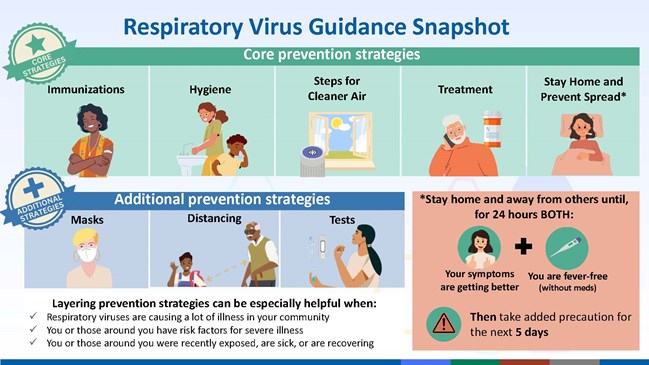Respiratory Viruses (COVID-19, RSV, and Influenza/flu)
Respiratory viruses COVID-19, RSV, and Influenza continue to circulate in our community. People should understand how best to protect themselves and what to do when they experience symptoms. For more information on respiratory diseases visit: https://www.cdc.gov/respiratory-viruses/index.html
The CDC recommends core prevention strategies to prevent viral respiratory illnesses. These include:
- Staying up to date with immunizations to protect people against serious illness, hospitalization and death. This includes influenza, COVID-19 and RSV if eligible.
- Practicing good hygiene by covering coughs and sneezes, washing or sanitizing hands often and cleaning frequently touched surfaces.
- Taking steps to improve air quality such as bringing in more fresh outside air, purifying indoor air, or gathering outdoors.
- Following recommendations when an individual has a respiratory illness including:
- Using precautions to prevent spread of the illness such as staying home and away from others when sick, waiting to return to normal activities until symptoms have been improving and no fever is present (without the use of fever-reducing medication) for at least 24 hours and using additional precautions for 5 days after returning to normal activities.
- Note: depending on the length of symptoms and duration of fever, this period of staying home and away from others could be shorter, the same, or longer than previous COVID-19 isolation guidance to isolate for a minimum of 5 days after onset.
- Seeking healthcare care promptly for testing and/or treatment if a person has risk factors for severe illness.
- Using additional prevention strategies including masks, physical distancing and testing for respiratory viruses.
For more information visit: https://www.cdc.gov/respiratory-viruses/index.html
For information on respiratory viruses data click here.
